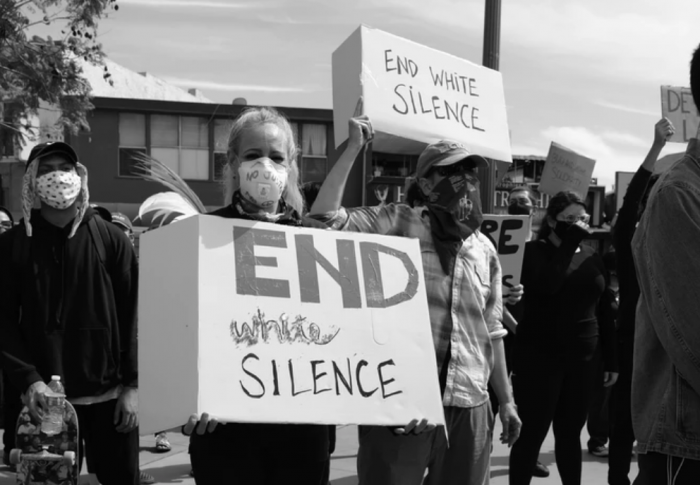I happened to catch the end of an interview on NPR about racism in the United States while driving last week.
The woman being interviewed was a professor at Harvard University. She shared how we don’t talk to all children about race or racism in this country early enough, and how harmful our silence can be.
It reminded me of a conversation I had with a good friend one night. We were discussing the prevalence of racism inside the LGBTQ community and my friend, Anthony, who is black, shared with me that as a young boy, his father sat him down to give him “the talk.” I asked, “What do you mean, ‘the talk?’”
Anthony proceeded to tell me that, as children, most African American boys are told about racism by their families and given rules to prevent them from being in harm’s way. His father warned him to take care whenever he was out in public, especially if there was a situation involving the police. For example, he learned to place his hands on the dashboard or steering wheel, and to always keep them visible if he were ever pulled over.
As he shared “the talk” with me, my heart dropped into my stomach. The shock and disbelief I had of my friend’s experience comes from the privilege I have as a white person living in a country with a long history of racism. Anthony and I are the exact same age. We’re both gay. We both went to college. And yet, because of the color of our skin, we had completely different experiences as two teenage boys getting ready to drive.
I shared this story with my nephew who is 15 and just got his driver’s permit. He’ll be getting his license later this year and I asked him if his dad has ever told him to keep his hands visible if he were to get pulled over. He said, “Not at all.” In fact, for most kids who are white, having “the talk,” is usually reserved for conversations about sex or drugs. Never about driving. Until we can understand the experiences of marginalized groups and have open and honest conversations, we won’t be able to heal from systemic fear-based social structures.
Silence, especially with regard to identity, is loud and often deafening. When we withhold the experiences from young people about entire groups of people, we send a powerful message. Sometimes, we think we choose to avoid having certain conversations because children are too young. If we’re honest with ourselves, it’s because of our own discomfort. And children are truth detectors—they sense fear.
Not communicating something still communicates something. Choosing not to share something with a child because we don’t think it’s necessary versus avoiding the conversation because of fear, shame, bias, or privilege are two distinctly different reasons.
In an article addressing race published on National Alliance on Mental Illness (NAMI), the author wrote, “Address race in therapy sessions. If your client is from another race and ethnicity, it is wise to address that in the first sessions. Making believe that we are all just one human race does not align with how our society actually views race.”
A few weeks ago, I watched a lecture given by a well-known motivational speaker and teacher. She’s an advocate for mental health, has written numerous best selling books, and is considered a thought leader for the next generation. During the lecture she commented on gender and said, “Can we just get rid of gender by now? I mean, we’re spiritual beings having a human experience.”
While audience members applauded her, and I certainly agree, the entire lecture was gendered. From multiple references she made about her skirt, makeup, and hair, to referring to her husband as a “manly man,” and her baby boy as liking typically male things like “muscle tees.” Now, I’m not saying any of that is bad. What I would like for us to pay attention to is how easy it is to make comments without examining the ways in which we contribute to behaviour. It can be easy to hide biases behind catchphrases because we don’t actually have to unpack why we’re using them in the first place.
Recently, a friend shared a video with me that showed a young boy being asked questions about a set of photos. Each photo had two children, one black, and one white. The father asked his son what stood out to him, and the little boy said everything but the differences in their color.
Although the father’s intention was to show that children aren’t born racist, when we don’t give young people the space to talk about differences, we’re actually perpetuating privilege and racism.
Children aren’t born racist or queerphobic. They are, though, born in a world with differences. There are differences in children’s genders, gender expressions, and sexualities, just as there are cultural and color differences among the human race.
However, because we live in a predominately straight and cisgender world, one in which white privilege and systemic racism is pervasive, it requires a concerted effort on our part, especially if we’re white parents and caregivers, to be aware of both the subtle and blatant ways we pass on bias and privilege.
Change is something that I do believe is happening, but when we make blanket statements like, “we’re spiritual beings having a human experience,” “kids aren’t born racist,” “I don’t see color,” or “love is love,” without exploring how privilege and racism still impact lived lives today, our good intentions aren’t enough.
More importantly, to demonstrate love is to challenge personal bias, explore privilege, and have proactive conversations with children at a young age so that we can prevent fear based social structures from taking root inside the consciousness of future generations.
“A person may cause evil to others not only by his actions but by his inaction, and in either case he is justly accountable to them for the injury.” ~ John Stuart Mill
~









Read 0 comments and reply